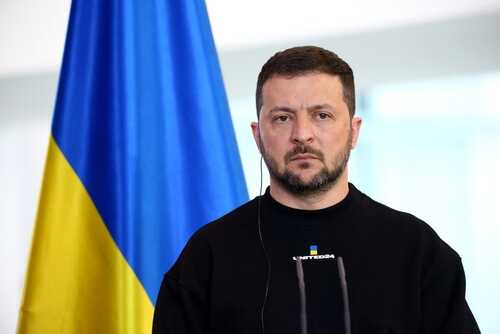(LibertySociety.com) – When a head of state demands not just victory, but the unseating of a nuclear superpower’s regime, history’s tectonic plates shift, and the aftershocks threaten to rattle every border in Europe.
Quick Take
- Zelensky’s speech at the OSCE/Helsinki conference was the first explicit, public call for regime change in Russia by a Ukrainian president.
- The address links European security not to policies, but to the survival of Russia’s current leadership.
- He advocates confiscating, not merely freezing, Russian assets to fund Ukraine’s defense and recovery.
- Western governments now face mounting pressure to escalate beyond traditional sanctions, with unpredictable consequences.
Zelensky Redraws the Map of European Security
On July 31, 2025, the Helsinki air crackled not with nostalgia for Cold War détente, but with the unmistakable urgency of a continent on edge. Ukrainian President Volodymyr Zelensky appeared on the flickering screens of the OSCE’s 50th anniversary summit and did what few expected: he called for nothing less than regime change in Moscow. This was no diplomatic slip. Zelensky’s message was surgical and unflinching, Europe’s future, he argued, depends not on ceasefires or sanctions, but on ensuring Russia’s current leadership is swept from power. For an audience old enough to recall the Helsinki Final Act’s optimism, the speech signaled an era where the old rules may no longer apply.
Just hours before Zelensky’s address, Russian missile and drone strikes left Ukrainian civilians dead and infrastructure in ruins. The timing was deliberate, the subtext impossible to miss: as long as Moscow’s war machine grinds on, no border is truly safe. Finland’s closed border with Russia stands as a grim reminder of these new realities, a country once a symbol of neutrality now forced to take sides in a conflict that threatens to engulf its neighborhood.
From Asset Freezes to Full Confiscation: A New Economic Front
Zelensky’s demands did not end at the Kremlin’s gates. He pressed for Western governments to move beyond asset freezes and to fully confiscate Russian state and oligarch wealth to bankroll Ukraine’s defense and reconstruction. This is a step that unsettles diplomats and lawyers alike. Seizing sovereign assets, rather than merely freezing them, tests the limits of international law and sets precedents that could boomerang back on any nation holding foreign reserves. Yet for Zelensky, the rationale is stark: as long as Russia’s resources remain intact, so does its ability to threaten its neighbors. The call for confiscation is not a legal argument but a survival instinct, and it puts Western capitals squarely in the crosshairs of escalation and retaliation.
Debate rages behind closed doors in Brussels, Berlin, and Washington. Is this the moment to strike harder, risking the unraveling of global financial norms? Or does restraint offer the only hope of avoiding a wider conflagration? The answers are murkier than ever, and each path is lined with risks that could echo for decades.
Regime Change: Rhetoric or Roadmap?
Western leaders have long danced around the idea of regime change in Moscow, wary of the chaos that could follow a power vacuum in the world’s largest nuclear arsenal. Zelensky’s speech breaks that taboo; it transforms what was once whispered in diplomatic corridors into a rallying cry broadcast across continents. His argument is simple, if chilling: “If the world doesn’t aim to change the regime in Russia, that means, even after the war ends, Moscow will still try to destabilize neighboring countries.” For Ukraine’s allies, this is both a provocation and a mirror, demanding they choose between short-term pragmatism and the pursuit of a more permanent peace.
Russia’s response is swift and predictably caustic. Kremlin officials denounce the speech as foreign meddling, warning of “grave consequences” for anyone attempting to upend the country’s leadership. Yet, behind the bluster, there’s a note of unease. The regime’s legitimacy, once taken for granted, now faces pressure not just from within but from a coalition of Western powers emboldened by Ukraine’s defiance.
The Stakes for Europe and the World
The implications stretch far beyond Kyiv or Moscow. For Europe’s aging population, many of whom lived through the Cold War’s anxious years, the spectacle of open calls for regime change in Russia is both deja vu and uncharted territory. The OSCE, designed as a forum for dialogue and peace, now finds itself sidelined as Russia pulls back from engagement. European capitals, already jittery from energy shocks and migrant crises, must now reckon with the possibility that the continent’s long peace was only an interlude.
Experts warn that crossing the Rubicon from sanctions to confiscation, and from policy change to regime change, invites consequences that no one can fully predict. Some leaders, especially in Eastern Europe, welcome the clarity and backbone of Zelensky’s stance. Others worry aloud about escalation and the risks of pushing a wounded regime into a corner. The debate is no longer theoretical. Every new missile strike, every frozen asset, every broken diplomatic protocol adds fuel to a crisis that will define the legacy of this generation’s leaders.
Copyright 2025, LibertySociety.com .
Click this link for the original source of this article.
Author: Editor
This content is courtesy of, and owned and copyrighted by, https://libertysociety.com and its author. This content is made available by use of the public RSS feed offered by the host site and is used for educational purposes only. If you are the author or represent the host site and would like this content removed now and in the future, please contact USSANews.com using the email address in the Contact page found in the website menu.








